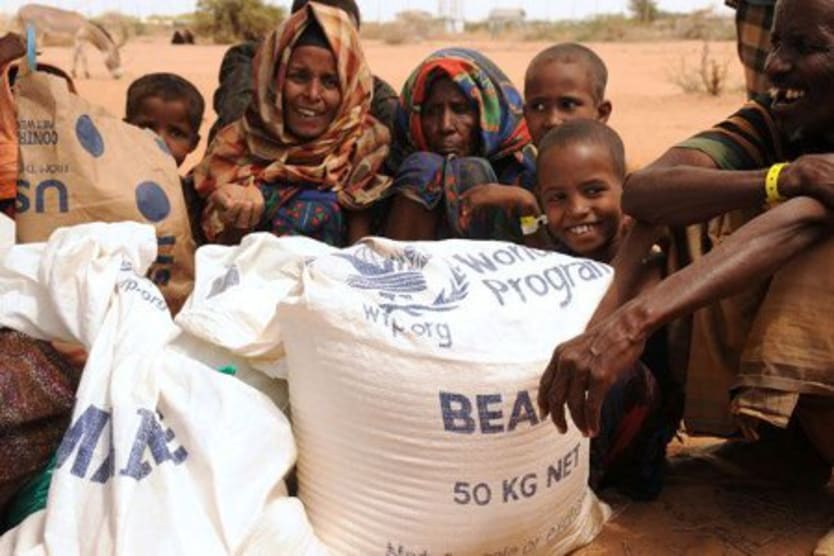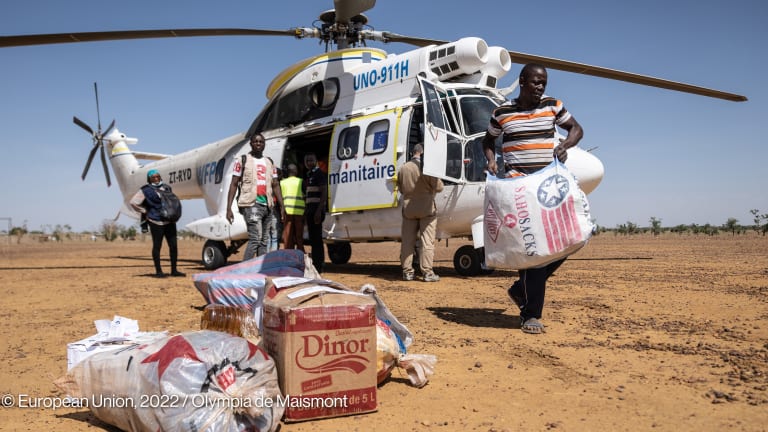
After some delay, more much-needed food aid from the World Food Program finally reaches drought-hit Somalia.
The United Nations was supposed to have started airlifting food from Nairobi, Kenya, to afflicted areas in the Horn of Africa on Tuesday, July 26. But delay in receiving clearance permissions meant flights couldn’t leave until the following day.
The first batch of food deliveries reached the Somalian capital, Mogadishu, on Wednesday, July 27.
“This will be the first of series of flights,” WFP spokesman David Orr said. “Once they start, they will just keep coming and coming in an ongoing operation.”
Administrative problems that prevented immediate delivery of food aid, however, have drawn criticism from many corners of the aid community, including donor representatives such as Dirk Niebel, Germany’s federal minister for economic cooperation and development. Niebel expressed his concern that despite having made available more than 60 million euros ($86.7 million) through bilateral and European channels, Somalia remains inaccessible.
“This is not a time for politics, this is a time for saving human lives,” Niebel said.
Somalia’s transitional government appeals for speed
The slow delivery of food aid, meanwhile, has led Omar Osman, a spokesman for Somalia’s transitional federal government, to urge humanitarian groups to expedite assistance. Osman said the situation is too dire to warrant going through normal processes.
To facilitate international aid, Osman said TFG Prime Minister Abdiweli Mohamed Ali has set up a committee to help humanitarian groups with their relief efforts. In addition, the TFG will continue to forward help offered by international aid organizations to refugees in rebel-controlled areas.
But while Ali pledged assistance to humanitarian organizations, he also said he will launch accountability measures to check how aid agencies are providing help. Ali said people in Mogadishu remain hungry despite the large sums of money aid groups have received to address the famine and drought in the area.
Ali made these comments during a quick visit to several refugee camps in the Wadajir, Waberi, and Hamarweyne districts of Mogadishu.
Pledges continue to pour in
Recognizing the severity of the situation in the Horn of Africa, ECHO chief Kristalina Georgieva said the EU will allocate an additional 27.8 million euros for the famine and drought victims in the area. The focus will be feeding the most vulnerable households and secure animal health in Kenya, Ethiopia, Somalia and Djibouti
On top of this, Georgieva said she is putting together an additional 60-million-euro aid package, which would raise the EU’s total famine response to 157.47 million euros. Georgieva made these comments after returning from a visit to Kenya and Somalia.
The EU is channeling all humanitarian aid to Somalia to groups already working on the ground to prevent people from crossing borders and to ensure aid worker security.
Even ordinary citizens have pledged support for the famine-stricken region. In Ireland, for instance, residents are expected to donate 20 million euros. This is on top of the 7 million euros worth of taxpayers’ money that the government will donate for the relief efforts.
South Korea has also donated $1.5 million to help fund humanitarian assistance to famine- and drought-affected communities in Kenya.
Read more development aid news online, and subscribe to The Development Newswire to receive top international development headlines from the world’s leading donors, news sources and opinion leaders – emailed to you FREE every business day.








